Information can’t keep up with misinformation about NC voting machines – ncpolicywatch.com
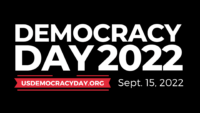 Commissioners’ meetings in Surry County are a showcase of election conspiracy theories where distrust of the machines that count ballots plays a starring role
Commissioners’ meetings in Surry County are a showcase of election conspiracy theories where distrust of the machines that count ballots plays a starring role
This story is part of a project called Democracy Day, in which newsrooms across the country are shining a light on threats to democracy.
The northwestern North Carolina county on the Virginia border is probably best known as the home of Mount Airy, the birthplace of Andy Griffith and the inspiration for Mayberry in his eponymous television show from the 1960s. This year, Surry County has been a stop on the circuit for prominent election deniers who falsely maintain that votes were engineered to have President Joe Biden win in 2020.
The county devoted nearly an entire May meeting to election deniers that featured David Clements, a former assistant professor at New Mexico State University who travels the country preaching about fraud. Clements, who lost his university job last year because he refused to wear a mask in class, urged Surry to hand-count ballots.
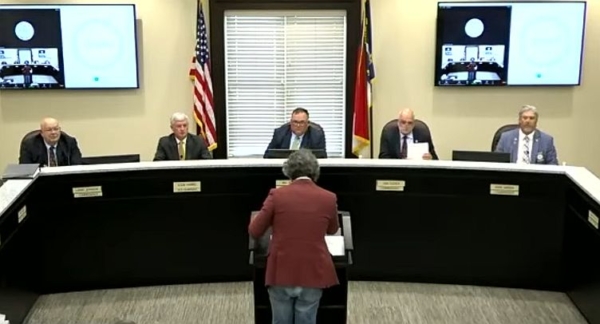
At the meeting’s end, Surry board Chairman Bill Goins told the crowd that commissioners were reviewing residents’ recommendations, but concerns about fraud should go to the local and state boards of elections. Someone in the crowd yelled “Pontius Pilate.”
Goins could not be reached by telephone this week.
The state Board of Elections runs a feature on its website and social media accounts called “Mythbuster Mondays” that took on the question about electronic tampering back in April.
“North Carolina voting equipment does not contain modem chips, and state law prohibits voting machines from being connected wirelessly to any other device,” says this myth-buster answer.
That didn’t end the rumors.
David H. Diamont, a former state House member from Surry, said the search for election fraud reflects a deep distrust in government.
“They just don’t trust government anymore,” Diamont said in an interview this week. “It’s a disease. It’s scary. It is so different from what it was when I was in politics.”
Most North Carolina voters mark paper ballots that are fed into tabulators. With former President Donald Trump’s lies about widespread voter fraud came assertions of tabulator tampering via internet connections. These beliefs have taken hold even in places like Surry where Trump won 75% of the vote.
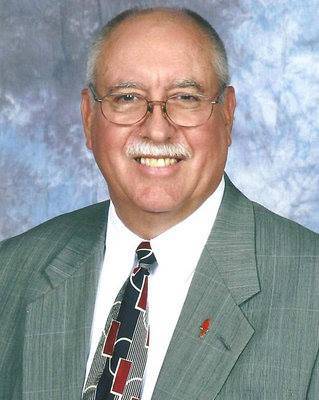
Dominion Voting Systems is suing former Trump lawyer Sidney Powell for her wild claims about its machines. In a motion to dismiss the lawsuit, Powell’s lawyers wrote last year that “no reasonable person would conclude that the statements were truly statements of fact.”
No North Carolina county uses Dominion equipment, yet Republicans have demanded to look inside the machines that get deployed to voting sites to search for modems or chips.
In the counties, demands to scrap machines for hand-counting are intersecting with the distrust over voting equipment.
Surry County GOP chairman Keith Senter told the Surry elections director she would lose her job or have her pay cut after she refused demands for access to voting equipment, Reuters reported.
Senter did not return phone calls this week, but he’s a regular at “open forum” portion of commissioners’ meetings.
“Were the machines in Surry County connected to the internet or do they have cell or internet capability?” he asked in April, invoking the names of nationally known election deniers, including ardent Trump backer My Pillow Guy Mike Lindell.
“The only way you will know is to do a forensic analysis of the machines.,” Senter said.
Senter’s appearances at commissioners’ meetings to rail about elections continued through the summer.
Among the pages on the state Board of Elections website about cybersecurity, elections security and misinformation is a page on voting machine security that attempts to knock down rumors about modem-embedded machines. It includes a statement from Trump himself released ahead of a trip to North Carolina last summer praising his victory in the state “without a fraudulent outcome.”
Election deniers have champions in the state legislature.
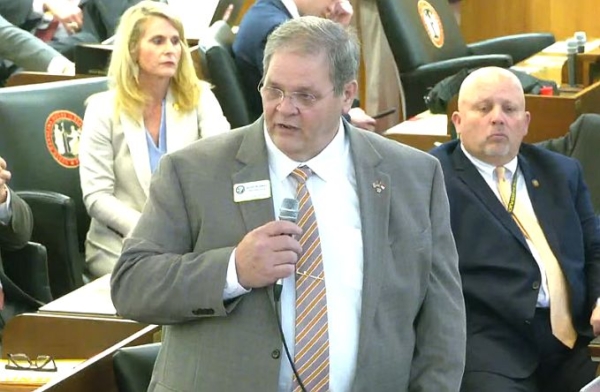
Members of the far-right Freedom Caucus in the North Carolina House announced at a press conference last October that they intended to inspect Durham County voting machines for devices that would enable internet connections. That investigation didn’t happen after the state Board of Elections director said unauthorized people can’t have access to voting machines.
In the lead up to October, correspondence between the office of Rep. Keith Kidwell, a Chocowinity Republican and chairman of the Freedom Caucus, and the Board of Elections in the summer of 2021 shows that caucus members had been trying to find a way to open active machines months before they announced they were going into Durham. Elections board staff had been meeting with caucus members about elections processes and trying to convince them that none of the machines used in North Carolina can access the internet.
“There are no mechanisms in place to send or receive data to or from any modem on certified voting equipment,” elections board spokesman Patrick Gannon told Kidwell in a June 8, 2021 email in answer to a question about modem capabilities.
“And state law prohibits any county from using a modem connection in voting equipment,” Gannon added.
The correspondence was obtained through a public records request.
A “Trusted Elections” tour that plans to stop in each of the state’s 14 congressional districts devotes time in each 90-minute town hall for an explanation on how voting machines work.
In addition to computer experts, the meetings feature county elections directors, Democratic and Republican elections lawyers, and Democratic and Republican members of county elections boards. The Carter Center, a nonprofit based in Atlanta, is sponsoring the tour. Bob Orr, a former Republican Supreme Court justice, and former Charlotte Mayor Jennifer Roberts are leading the effort.
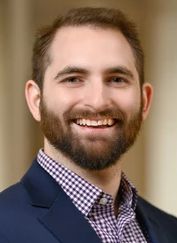
At the Johnston County courthouse on Aug. 31, Brad Reaves, an expert in computer system privacy at NC State University told the audience that none of the state’s voting machines can be hacked because they’re never connected to a network.
Mitch Kokai, senior political analyst at the John Locke Foundation, moderated the session and asked panelist questions the audience submitted. The local elections officials got the challenging ones.
Among the questions: Why can’t a county hand-count if that’s what the community wants to do?
Johnston County elections board Chairman Gordon Woodruff said there are far too many ballots to count by hand. About 111,000 people voted in Johnston County in 2020.
Recent recounts have found errors of one or two votes, representing a tiny fraction of 1%, he said. And the hand-eye audits that the state requires for selected precincts confirm the machines’ accuracy, he said.
“The machines are so good, it’s really not a major issue,” Woodruff said.
Nonetheless, interest in hand-counting is taking root. It’s become a theme for the half-dozen or so people who regularly attended Surry commissioners’ meetings this summer to complain about elections.
One resident told Surry commissioners that school children should be given the task of counting ballots as part of civics instruction starting in sixth grade.
In an interview this week, Orr said elections officials have appreciated the chance to talk about what they do. Participants aren’t there to challenge people’s beliefs, he said, but to let audiences hear from the local people who run elections about how it all works.
Some of the same questions get asked at every stop, Orr said. He thinks members of groups challenging the elections go to the town halls to raise them.
The only real “vocal pushback” so far came in New Bern, where a video substituted for a live election security expert. People in the audience called it “propaganda” and “lies,” he said
“It’s lack of information, or understanding, or confidence in technology,” Orr said. “I don’t’ know what you do about that, but we’re trying.”
The “Trusted Elections” tour has an online town hall scheduled for Monday, Sept. 19.
This article has been archived for your research. Find the original article here.